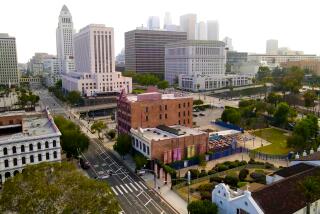2 Indian Groups, U. S. Defend Plan for Reburials
- Share via
Attorneys for two American Indian groups and government agencies argued in federal court Monday that the movement and reburial of ancient Chumash Indian bones found in a Ventura County flood-control channel do not violate the religious rights of a Chumash faction opposed to the plan.
Attorneys representing rival Indian groups, who are engaged in a legal dispute over a Chumash burial site near Point Mugu, presented closing arguments before U. S. District Court Judge Pamela A. Rymer.
The judge said she would decide today whether to order a temporary halt to the removal and reburial of the remains.
The Southern Council of the Coastal Band of the Chumash Nation has filed a $50-million lawsuit against the two other Indian groups, as well as county, state and federal agencies, protesting their plan to exhume the remains of at least 20 Indians and rebury them in a Thousand Oaks park.
Representatives of two Indian groups named in the suit--the Candelaria American Indian Council and the Ventureno Band of the Chumash--argued Monday that reburial is the best way to protect the remains from vandalism and flooding.
But Coastal Band Indians claim that their religion prohibits the disturbance of their ancestors’ graves.
However, attorneys for federal and Ventura County agencies named in the suit argued that the Chumash have agreed to reburial plans in the past.
Ban on Reburial Disputed
Assistant U. S. Atty. Diane Bardsley, representing the Army Corps of Engineers, disputed the testimony last week of Chumash medicine people that reburial violated their religious beliefs. Chumash tribal guidelines allow for the removal and reburial of bones when the remains are disturbed by development, Bardsley said in her closing argument.
Sidney Flores, an attorney representing the Coastal Band, asked the judge to order county and federal officials to study Chumash religious beliefs concerning reburial and have Chumash Indians themselves participate in determining the size of the ancient burial ground. Then, Flores said, the court should review several plans to keep the remains from being washed to sea by the runoff from a major rainstorm.
Archeologists from California State University, Northridge are excavating the burial site to determine if there are more remains.
The Ventura County Board of Supervisors, in October, rejected four proposals to protect the bones, including a $5-million plan to reroute the Calleguas Creek flood-control channel away from the burial site. Instead, the county agreed last month to spend about $80,000 to hire archeologists to determine how many Chumash Indians are buried there and to rebury their remains in Oakbrook Park.
The board acted after federal officials warned that, under federal regulations for archeological sites, the county is obligated to protect the remains or it will lose $785,000 in federal flood-control funds.
More to Read
Sign up for Essential California
The most important California stories and recommendations in your inbox every morning.
You may occasionally receive promotional content from the Los Angeles Times.










